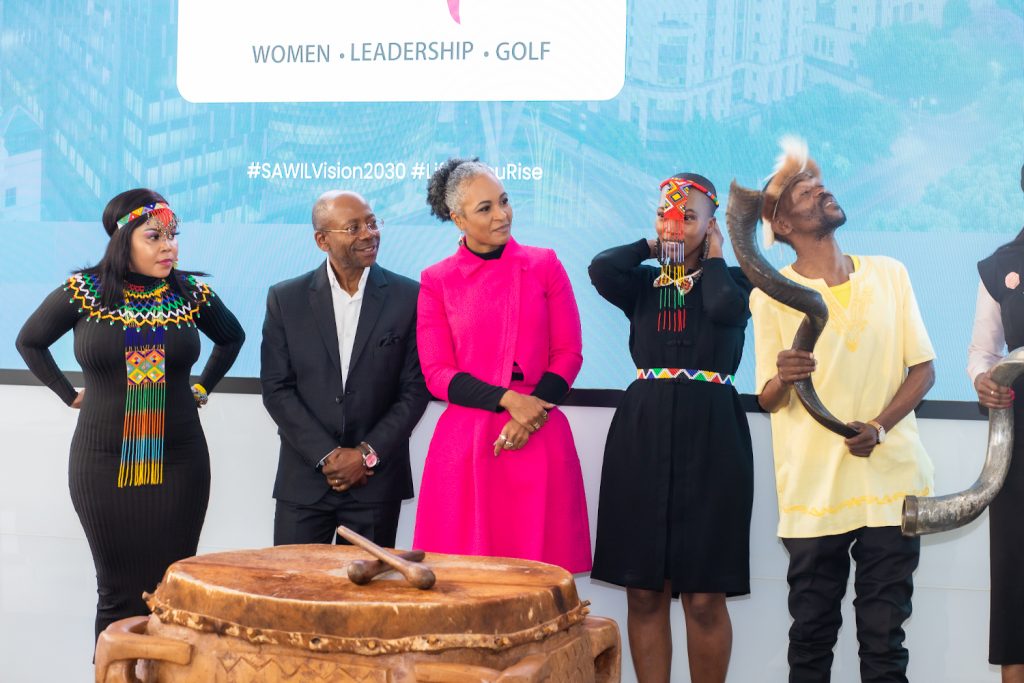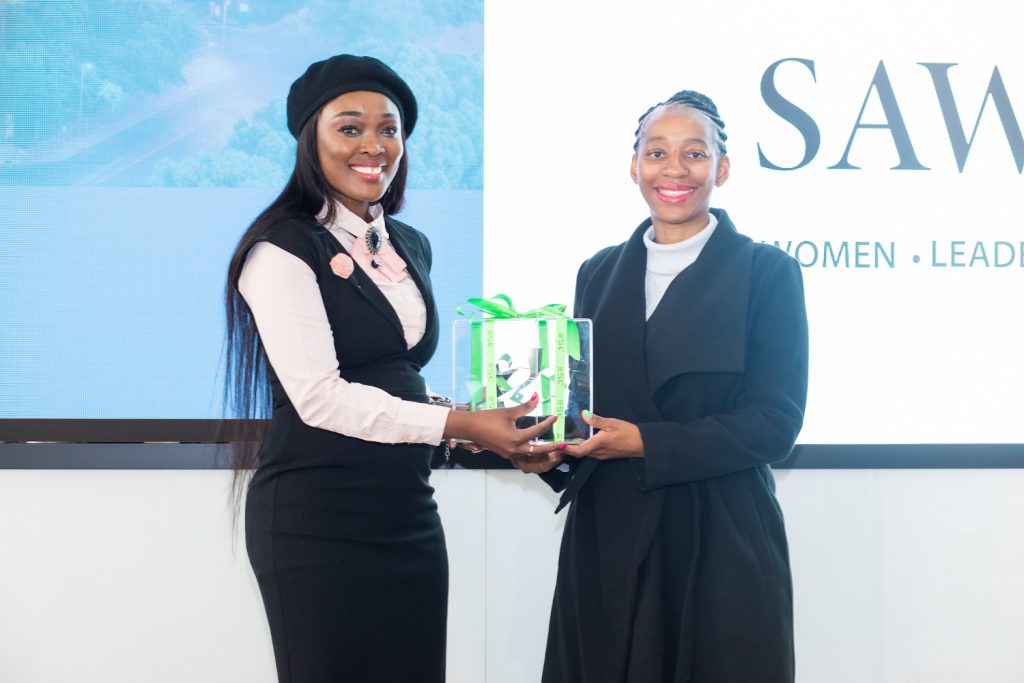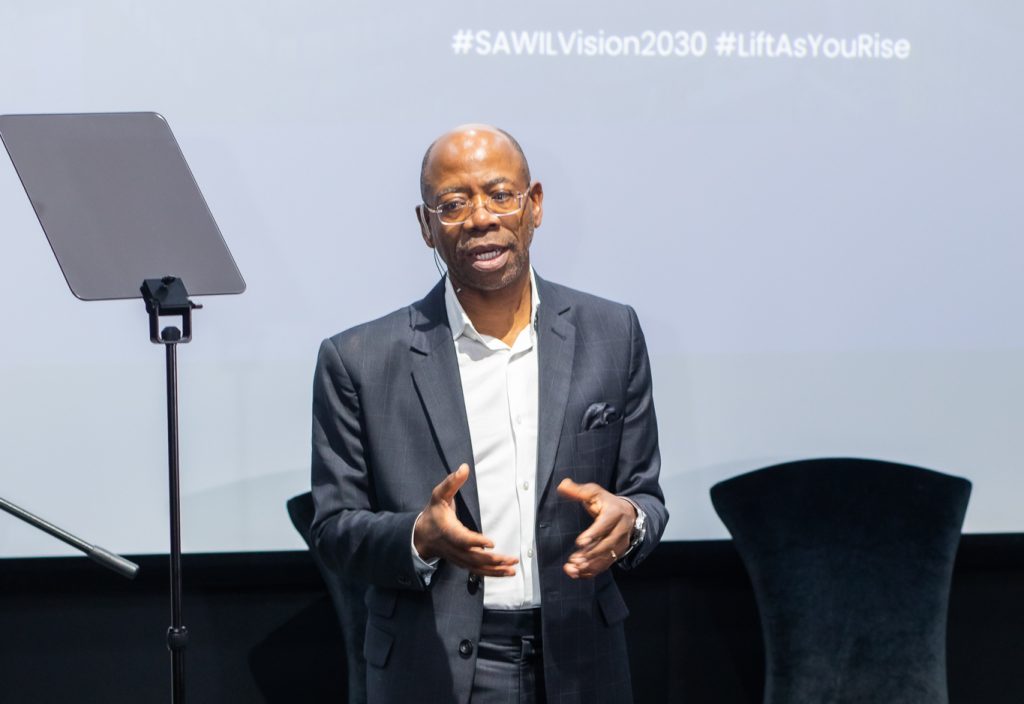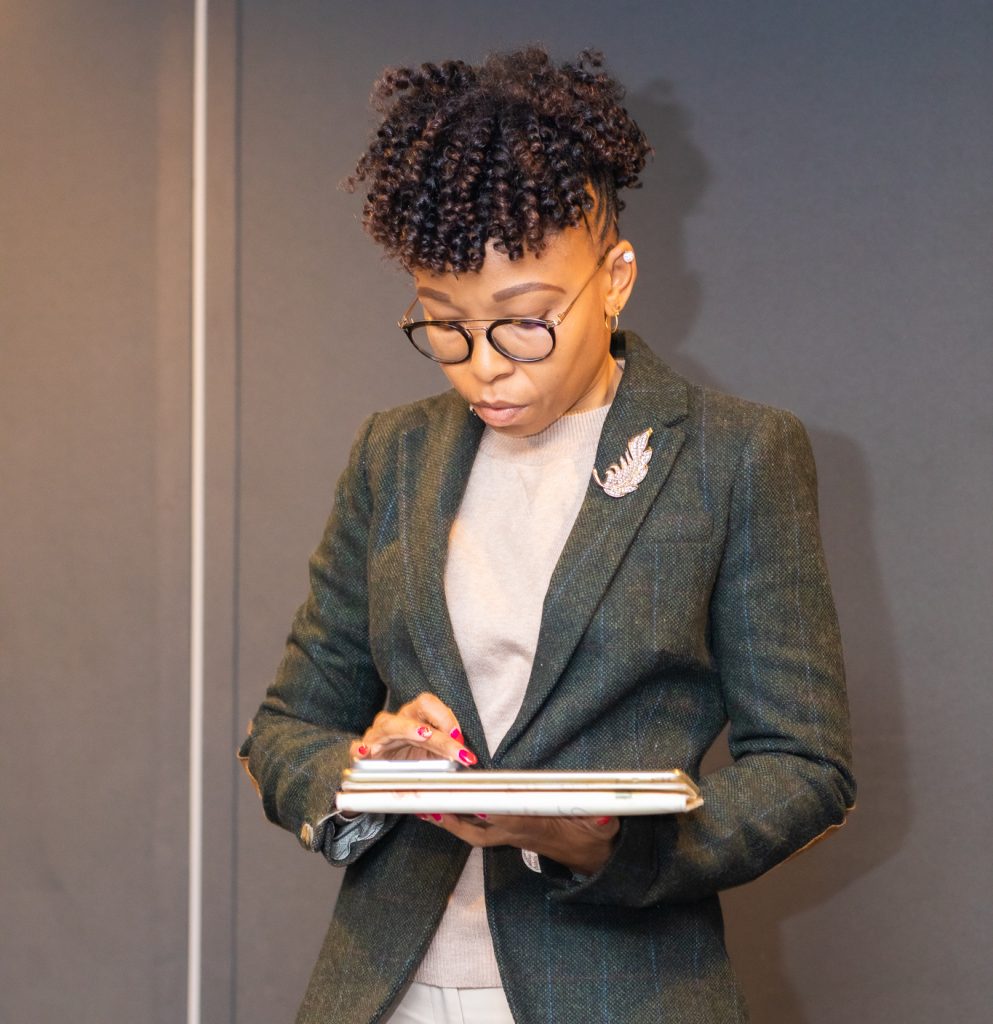SAWIL founder Seipati Mokhuoa launches the organisation’s flagship chapter at the Johannesburg Stock Exchange in Sandton
Of the 329 executives of JSE-listed companies, only 6% are women. By 2030, however, this number will likely rise to 30%. That was the commitment from Strategic African Women in Leadership (SAWIL) in July, at the launch of its flagship chapter at the Johannesburg Stock Exchange (JSE) in Sandton.
The organisation was founded in 2014 to address a personal and professional need, explained SAWIL founder Seipati Mokhuoa. As she climbed the corporate ladder, she found fewer people who resembled her and could relate to her experiences as a black woman in business. “When I was appointed to more senior roles, no one who looked or sounded like me had ever held that position before,” she remembered. “I was often the first person of colour, and the first woman of any colour, to be appointed into these roles.”
 President of BUSA and leadership coach Dr Claudelle von Eck (In pink dress) with traditionally dressed folk enjoying a light moment at the launch
President of BUSA and leadership coach Dr Claudelle von Eck (In pink dress) with traditionally dressed folk enjoying a light moment at the launch
The C-suite was, as she recalled, “still so pale and so male” and she was tired of being the only black woman at the boardroom table: “I worked so hard to get there, to earn my spot, but I was still considered less than the men, and expected to do menial tasks like run errands, even at a senior level. I knew I couldn’t be the only woman going through this — and I wished there was an organisation or a collective whose wisdom I could tap into.”
When Mokhuoa could not find such a space, she decided to create one instead. SAWIL was formed as a platform to congregate, learn, engage and empower: “We’re building a safe and thriving space to tap into, and with the intent build the Africa that we want and deserve.”
She said the organisation exists to encourage and empower women to do better — for themselves, and for other women. “Our vision is to see more women step up and take their rightful place in leadership and as economic powerhouses,” she said. One of SAWIL’s goals is to see 30% female representation in the JSE and other stock exchanges on the continent.
To date, however, of JSE-listed companies 86% of their CEOs are white, and they earn an average of 37% more than people of colour in the same roles. “We cannot have this; we need to transform corporate South Africa,” she explained. “We will plant this seed in South Africa, but we know that soon the tree that grows will cast shade over all of Africa.”
 SAWIL founder Seipati Mokhuoa hands an award over at the launch
SAWIL founder Seipati Mokhuoa hands an award over at the launch
When women lead, change happens: “So why aren’t we leading? We owe it to the women who came before us and to ourselves to make sure the blood, sweat and tears were worth it.”
She finds the double standards strange: “Women are the decision-makers in the home and decide how their households are run. They make most of the choices when it comes to spending, but in the business world they are not trusted to make sound economic decisions.”
She extended a challenge to those in attendance: “Let’s use our buying power to challenge the status quo and lead change. Before you spend money, look at the board of directors of the company and see if you and your interests are represented there. If there aren’t, then don’t accept their excuses, because Africa does not lack talent.”
Mokhuoa’s advice for women in leadership is to invest in self-development: “Read books, listen to podcasts, always keep learning — and find your tribe! It’s true that in business it’s not always about what you know, but rather who you know.”
Transform business to transform society
In his keynote speech at the Sandton chapter launch, veteran businessman and President of Business Unity South Africa (BUSA) Professor Bonang Mohale threw his support behind SAWIL and its goals: “People trust business two times more than they trust the government, so we need to do something with that trust and stick our necks out for things that genuinely matter. There were 1 348 individuals and companies that aided and abetted state capture. As business, we should hang our heads in shame, but more than that, we must foster bold and incisive leadership and transformation. As business, we need to self-correct, because the business world is not South Africa’s second chance; it’s our last chance.”
 President of Business Unity South Africa, Professor Bonang Mohale, delivers the keynote address
President of Business Unity South Africa, Professor Bonang Mohale, delivers the keynote address
The business sector can make the country work again, but corporate South Africa first needs to get its voice back and regain its integrity and reputation. “What we need to do is to say unequivocally that we don’t need government permission to fix things or to change things; we don’t need government permission to pay SMMEs on time or fix issues of gender equality within our own organisations.”
If corporate South Africa fails, Mohale said the country will just become another failed African state. “Africa is not poor, it is just poorly managed,” he said. “And unfortunately poverty has a face that is black and is feminine. To change that, we need to do something interventionist and something truly transformational.”
He said that the eight countries with the best Covid-19 responses had one thing in common — they were led by women. “Put a smartphone in the hands of a woman and we know that nutrition improves, education improves, and not just for her and her children, but for her entire community.
“When business is transformed, South Africa will be transformed,” he concluded. “None of us will be wealthy if all of us are not okay; you cannot be an island of prosperity in an ocean of poverty. There is no exercise more powerful than extending a hand downward, and lift as you rise! You don’t have to wait until you’re in the C-suite before you open the doors for others; let them follow in your slipstream and lift as you rise!”
Reimagine the system
Renowned leadership coach Dr Claudelle von Eck has experience as an executive officer and as a non-executive director. She told attendees at the launch that before the system can be changed, it must first be understood. “Systems tend to resist change, and if we’re not addressing the foundations of the inequalities and the root of the problem, then we’re just speaking to the symptoms and not the cause,” she explained. “And if we’re going to step into a new space but just become carbon copies of the system, to emulate the system, then we can’t expect it to change.”
Having more women in leadership does not mean anything if the underlying causes of a lack of diversity in business is not addressed. “Then it’s just the same system with a different face,” she said.
Njabulo Mashigo is HR Leader at Vodacom. She agreed that the urge to simply adopt the system once inside it can be overwhelming. “It’s easier to assimilate, and if you do the rewards are instant,” she explains. The system will resist change, and will try to seduce those who are in it — the women who push back must be brave, because there will be a price to pay.
 Radio presenter and talk show host Seipati Seoke facilitating the panel discussions at the launch
Radio presenter and talk show host Seipati Seoke facilitating the panel discussions at the launch
And this fight for change will be exhausting, but Mashigo advised women to remember: “When we are tired we rest; we don’t give up.”
Organisations like SAWIL are important to bring women together and build their capacity through training, coaching and networking. More than that, however, is the power that comes from collectivism — collective action and a collective voice. “Just imagine the impact if everyone in this room decided on a single issue to put on the agenda for the next month,” said Von Eck. “And imagine that for the next month, in boardrooms across the continent, different executives from different organisations have the same conversation and raise the same issues and concerns and solutions. That is how we drive change at a macro level.” — Jamaine Krige